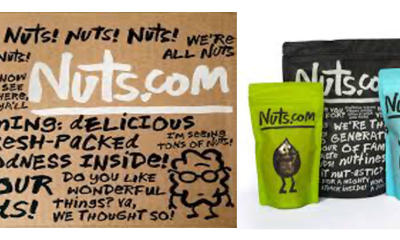Package Design
When It Comes to Corrugated, the Brown Box Is Green
Published
5 years agoon
By
Linda Casey
Corrugated, made from a natural renewable resource, has a great environmental record. It is almost always manufactured using high percentages of recovered fiber from old corrugated containers (OCC) and in some cases additional fiber from mixed paper, thereby diverting these materials from landfills.
For over a decade, the amount of corrugated recovered and recycled in the US has hovered around 90% of production. In fact, corrugated has the best recycling rate of any packaging material used today. And the same box fibers can be recycled time and time again to make new boxes and other paper products. The average corrugated box contains 50% recycled fiber, and the manufacture of new corrugated boxes perpetuates a continuous market for the recovered material, adding to its value.
Reducing the impact on landfills
Advertisement
Recycling is a big part of corrugated’s sustainability, but it is not the whole story. The corrugated industry regularly conducts third-party, peer-reviewed Life Cycle Assessment (LCA) studies to monitor the environmental impact of its products and to help guide continuous improvement in this area.
An LCA is a standardized, scientific tool to assess environmental impacts associated with all stages of a product’s life, from cradle to grave or raw material extraction to end-of-life. LCAs are used to inform public policy; assist in research and development; and aid in decisions surrounding waste management, biofuels, and renewable energy.
Corrugated manufacturers continually work to increase use of biofuels and decrease use of fossil fuels for energy, and to improve energy efficiency and product performance through better engineering. Between 2006 and 2014, the latest corrugated industry average LCA shows the industry reduced its greenhouse gas emissions by 35 percent, in addition to improvements in other environmental impacts.
Advertisement
The Environmental Protection Agency (EPA) reports that paper and paperboard packaging (including corrugated) account for more than 75% of all packaging materials that are recycled in the U.S., compared to only small fractions of glass, plastic, steel, aluminum and other materials. Clearly, as retail moves more and more to e-commerce, brands will continue to use corrugated as the preferred packaging choice — especially as they compete for younger consumers for whom sustainability is a must.
Fewer truckloads means lower emissions
Multiple studies have shown that corrugated makes the most efficient use of space in truckloads, an important determinant of shipping costs and environmental impacts. With smart design, boxes can be right-sized to any product — eliminating wasted space and minimizing the need for void fill materials, such as air pillows and packing peanuts.
Advertisement
The corrugated industry ran multiple case studies to compare the system cost of transporting various fresh produce commodities in corrugated versus reusable plastic containers (RPCs). Every study showed that corrugated is the more efficient choice. It provides the greatest cube utilization, and its light weight allows a truckload to cube out before it weighs out — meaning that every available inch of space is optimally utilized, minimizing freight and handling costs with fewer trucks, less fuel and lower emissions. In other words, corrugated leaves a much lighter environmental footprint.
Find more information on this topic at

SPONSORED VIDEO
Branding with Ferocity – Thinking Like an Indie Brand
Get a better understanding on how to leverage new technologies to engage and delight shoppers, sustainability’s role in product and package design – being sustainable and premium are not mutually exclusive, plus best practices and tips for collaboration and how to launch new products and refresh existing product line-ups and brands.
You may like
Advertisement
Subscribe

BULLETINS
Get the most important news and business
ideas from BXP Magazine's news bulletin.
Advertisement







